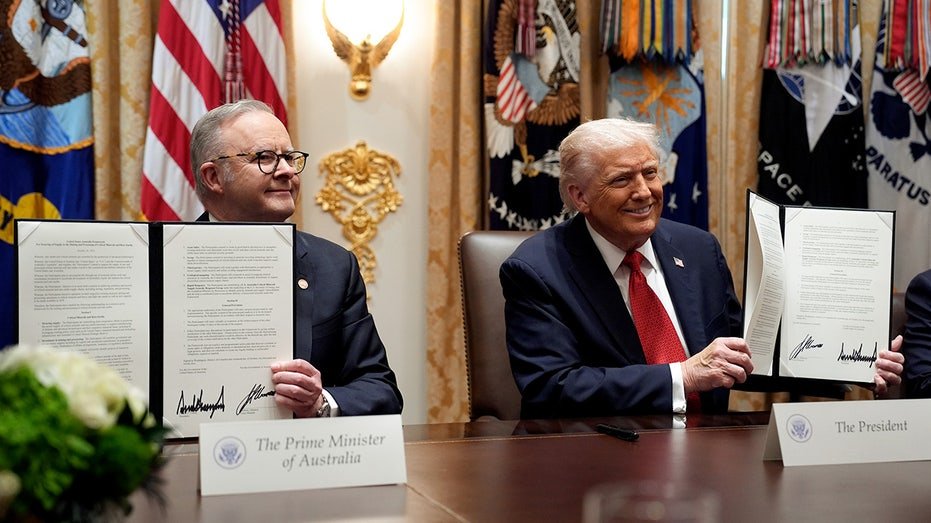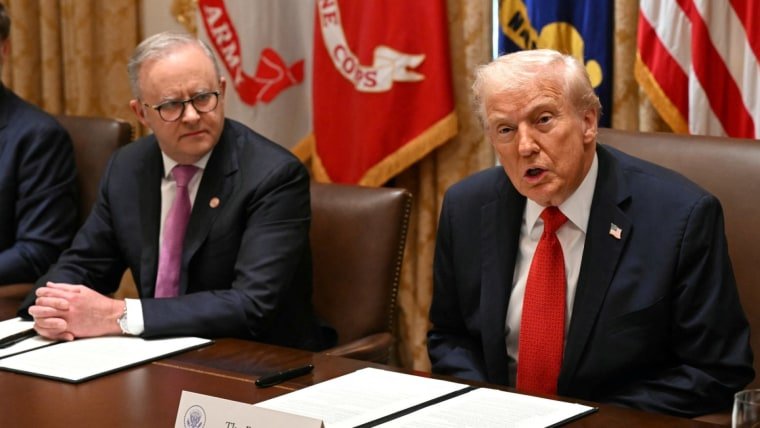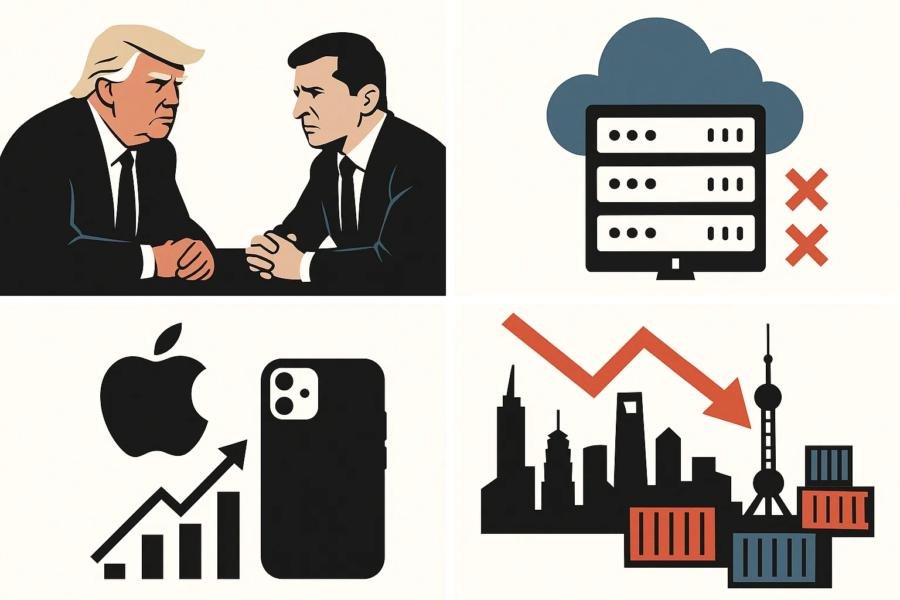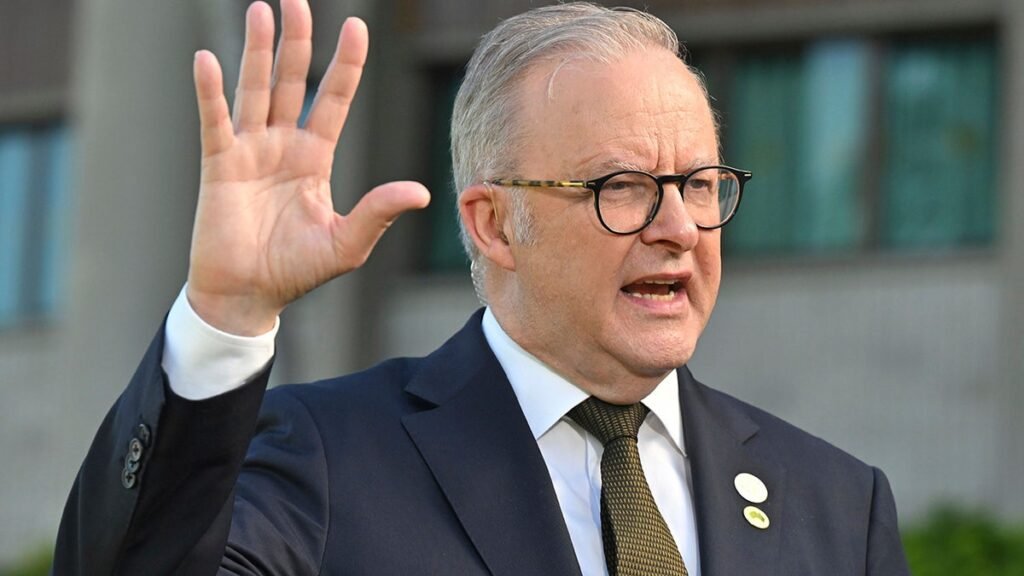President Trump floated a list of demands for China on Sunday, citing rare earths, fentanyl, and soybeans as his top issues to address with Beijing at the negotiating table and before the fragile tariff and trade truce between the world’s largest economies expires.
“I don’t want them to play the rare earth game with us,” Trump said on Air Force One.
Last week, Trump said threatened high tariffs on Chinese goods were “not sustainable,” easing fears of further trade escalation between the countries and helping boost stocks. Treasury Secretary Scott Bessent has said the countries will hold talks later this week, and Trump and Chinese President Xi Jinping are scheduled to meet later this month.
The US and China have seen their fragile trade relationship wobble further in recent weeks, with Trump confirming last week that the countries are in a trade war.
China accused the US last week of causing “panic” over Beijing’s export controls on rare earth materials, according to a report in China’s state newspaper, the Global Times.
Trump said the US would impose an additional 100% tariff on Chinese goods starting on Nov. 1 over Beijing’s plan to impose new export controls on rare earth minerals.
Since then, however, China sanctioned US units of a South Korean shipping company, while Trump threatened to further curtail trade with the country in response to its halt of US soybean purchases.
“I think we’re going to do fine with China,” Trump said.
Read more: What Trump’s tariffs mean for the economy and your wallet
-
The US budget deficit declined for the 2025 fiscal year, due in part to a surge in tariff revenues. The deficit fell 2% for the fiscal year to $1.78 trillion, down from $1.82 trillion in 2024.
-
The White House is ready to ease tariffs on the US auto industry, delivering a major win for carmakers who have lobbied to reduce the fallout from higher import duties. The Commerce Department is set to announce a five-year extension that allows automakers to reduce what they pay in tariffs on imported car parts.
-
Americans are set to pay more than half of President Trump’s tariffs as companies raise prices, according to Goldman Sachs.
-
Early next month, the US Supreme Court is set to hear a challenge to Trump’s most sweeping tariffs — the “reciprocal” country-by-country duties that you can see in the graphic above. A ruling against the tariffs — which would be in line with lower-court decisions — could have significant ramifications for Trump’s tariff strategy.
-
New duties on kitchen cabinets and vanities took effect Oct. 1.
-
Tariffs on timber and certain wood products (like furniture) took effect Oct. 14.
LIVE 54 updates
-
Trump lists top demands on China before trade talks resume
President Trump has said rare earths, fentanyl, and soybeans are his top issues with China, days before Washington and Beijing head back to the negotiating table and the trade truce nears expiration.
Trump also suggested Beijing failed to curb fentanyl exports, which he alleged is contributing to America’s opioid crisis.
Bloomberg News reports:
-
China Q3 GDP growth slows to 4.8% as tariffs hit
China’s economic growth slowed to the weakest pace in a year in the third quarter despite a boom in exports, according to data on Monday from China’s National Bureau of Statistics.
A prolonged property slump and trade tensions have hurt demand, putting pressure on policymakers to provide more stimulus.
Monday’s data showed that the gross domestic product (GDP) grew 4.8% from July to September, slowing to 5.2% in the second quarter.
Reuters reports on the takeaways from analysts:
-
Coffee break may be coming, with legislation introduced to exempt it from Trump’s tariffs
The rising cost of coffee beans has pushed restaurants and coffee shops across the US to pass along those price increases to consumers, as the effects of President Donald Trump’s tariffs continue to ripple across the economy.
But there may be a break on the horizon for coffee drinkers, CNN reports, with two members of Congress introducing legislation to give coffee products an exemption.
-
Tariff rollercoaster prompts Chinese exporters to ‘give up’ on US
Amid tense US-China trade relations Chinese exporters have given up on the US and responded to high duties by selling more goods to buyers in Europe, Latin America and the Middle East and Africa.
Reuters reports
-
Ulysse Nardin CEO says tariffs won’t ‘massively’ impact the luxury Swiss watchmaker’s business
As luxury Swiss watchmaker Ulysse Nardin debuted its latest high-end Freak watch at New York Watch Week, CEO Patrick Pruniaux said he’s not concerned about the impact President Trump’s tariffs may have on its bottom line, Pras Subramanian reports:
-
Uncertainty over Russian oil is partly about Trump’s global tariffs
Oil markets are trying to make sense of claims from Donald Trump about whether India and China will continue to purchase Russian oil, offering the latest example of how the president is willing to intertwine energy, trade, and geopolitics.
This past week has seen Trump repeatedly claim that India is soon set to buy “no oil” from Russia, which, earlier in the week, Indian officials declined to confirm.
Trump was unbowed, saying Friday at the White House, “They’ve already de-escalated.”
Equally significant as both sides navigate the oil issue is the fact that Indian officials were also in Washington this past week for the annual meetings of the IMF and World Bank, where they reportedly talked trade with the Trump administration.
On the table are 25% blanket duties on India over the issue of Russia oil purchases, on top of 25% “reciprocal” duties.
-
Trump administration offers news details of coming tariffs on trucks and buses
The White House on Friday formalized President Trump’s plan for 25% tariffs on medium and heavy-duty trucks and offered new details about how they will work, including a sizable exception for auto parts after a flurry of truck-maker objections.
The new tariffs — set to take effect on Nov. 1 — include a topline rate of 25% on everything from box trucks to the largest trucks on the road. The new tariffs will also have a 10% rate on foreign-made buses.
The picture for trucks that use foreign parts is more complex after automakers noted that their supply chains often mean even “American-made” cars and trucks require a substantial number of foreign-made parts.
The new rules have a similar 25% top-line rate for parts but also expand the auto offset adjustment program — which was previously rolled out for consumer vehicles — to trucks.
This program allows much of an automobile’s foreign parts to be offset up to 3.75% of the final retail price.
For many automakers that are not overly reliant on foreign parts, that provision effectively wipes out the costs of tariffs completely. “The idea here is we want domestic vehicle manufacturing,” said a senior administration official briefing reporters about the details of the plan.
The move is a formalization of a promise Trump made earlier this month.
“Beginning November 1st, 2025, all Medium and Heavy Duty Trucks coming into the United States from other Countries will be Tariffed at the Rate of 25%,” he wrote on Truth Social on October 6.
-
Swiss minister speaks to Bessent, gives no sign of progress on tariffs
Reuters reports:
-
Trump strikes deal with Merck KGaA on tariffs, IVF costs
President Trump and Germany’s Merck KGaA (MRK.DE) have struck a deal to provide discounted IVF drugs to the US in exchange for tariff relief.
Bloomberg News reports:
-
China accuses US of undermining WTO with tariffs, sanctions
China’s Ministry of Commerce said on Friday that it will escalate actions against the US at the World Trade Organization, claiming that the United States has been undermining the WTO since President Trump took office in January.
According to Reuters, China intends to scrutinize US trade policies using the WTO review process and work with members to restore a functioning appeals process for enforcing rules. The ministry alleged that US discriminatory policies, reciprocal tariffs, and unilateral sanctions violated WTO commitments.
-
Trump says high threatened tariff levels on China are ‘not sustainable’
President Trump on Friday said threatened high tariffs on Chinese goods were “not sustainable,” easing fears of further trade escalation between the countries.
“But that’s what the number is,” he said during an interview with Fox Business. “It’s probably not [sustainable] — you know, it could stand, but they forced me to do that.”
Trump also suggested a long-planned meeting with Xi Jinping was still on track, saying he planned to meet with China’s leader in two weeks.
Watch the clip of the interview here:
-
Tariffs help trim US deficit in first drop since COVID
Tariffs have helped to trim the US deficit in the first drop seen since COVID. The US budget deficit declined for the 2025 fiscal year as tariff revenue hit a record high.
Reuters reports:
-
US nears tariff relief for auto industry after lobbying push
-
China: The US is ‘creating unnecessary misunderstanding and panic’
China has accused the US of causing “panic” over Beijing’s restrictions on rare earth materials. According to the Chinese state newspaper, the Global Times, Ministry of Commerce spokesperson He Yongqian said that the US is exaggerating “China’s measures” and “deliberately creating unnecessary misunderstanding and panic.”
These latest comments from China follow a week-long war of words between Washington and Beijing. It began with China restricting rare earth exports, followed by Beijing announcing it would investigate US chipmaker Qualcomm (QCOM) and placing restrictions on Nvidia (NVDA) chips. President Trump responded last week Friday and said he would put an additional 100% tariffs on China.
“The US has long exercised extraterritorial jurisdiction — it began decades ago,” she continued. “Since 2022, Washington has repeatedly imposed semiconductor export restrictions targeting China, abusing the ‘foreign direct product rule’ and zero-threshold content rules to pressure other countries into containing China,” Yongqian said.
“The accusations from the US reveal that the US is projecting its own behavior onto others. Safeguarding global supply chain security and stability requires joint efforts from all nations, including the US.”
China has indicated that they are open to talks, despite Trump confirming this week that the countries are “in” a trade war.
-
US and Canada weigh revival of ‘zombie’ Keystone XL pipeline in trade talks
As part of a trade deal, the US and Canada are weighing the option of reviving a controversial oil pipeline, which could be used as a bargaining tool to ease some of the tariff tensions of President Trump’s steel and aluminum duties.
The FT reports:
-
Xi’s rare earth shock gives Trump a chance to win over US allies
President Trump’s “Liberation Day” tariffs alienated longtime allies and allowed China to build stronger relations with the world. However, since Beijing introduced export restrictions on rare earths, the tables might finally be turning in Trump’s favor.
Bloomberg News reports:
-
Trump strikes deal with Merck on tariffs and IVF drugs
-
Ontario premier threatens to cut off supply of potash, critical minerals amid trade war
Ontario Premier Doug Ford said on Thursday that Canada could cut off the flow of critical minerals, uranium, and potash to the United States if President Trump continues to threaten the country’s economy.
“We will not send a grain of critical minerals down there as long as we’re under constant attack by President Trump,” Ford said, as reported by Yahoo Finance Canada’s Jeff Lagerquist. “I’d love to send them down to our neighbours, but it’s not going to happen.”
Ford emphasized the US’s reliance on potash, which is used as a fertilizer, saying that US farmers would be “devastated” if Canada were to cut off the supply. He also spoke of the US’s reliance on critical minerals and uranium to build data centers for the adoption of artificial intelligence.
“They’re in desperate need of our energy,” Ford said. “Uranium gets shipped from Saskatchewan over to Port Hope in Ontario, gets refined here, and then gets enriched down in the U.S. They have 94 turbines that rely on Canadian uranium.”
Ford’s comments came after Stellantis (STLA) announced it was moving Jeep production from Ontario to Illinois, which Canada’s Prime Minister Mark Carney attributed to the tariffs the US imposed on
-
India: We are ‘not aware of any conversation between’ Modi and Trump
India’s foreign ministry said on Thursday that it is unaware of any conversation between Prime Minister Modi and President Trump around New Delhi reducing its Russian oil buys and stepping up its purchase of US crude oil and natural gas.
Bloomberg News reports:
-
Global CEOs to meet Chinese trade negotiator as tensions linger
Global CEOs, such as Apple’s (AAPL) Tim Cook are expected to meet with Chinese negotiator He Lifeng in Beijing this week, according to people familiar with the matter. The sit down comes at a time when trade tensions between the US and China are rising, with Beijing restricting exports of rare earths and President Trump threatening China with an additional 100% tariffs.
Bloomberg News reports:









